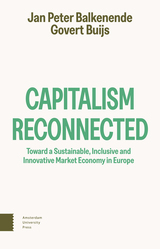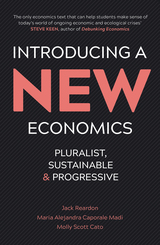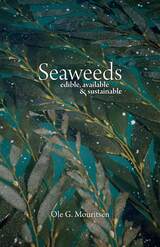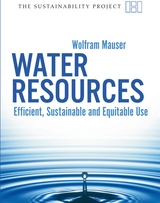5 books about Sustainable

Capitalism Reconnected
Toward a Sustainable, Inclusive and Innovative Market Economy in Europe
Jan Peter Balkenende
Amsterdam University Press, 2024
Capitalism has gone astray. Today we face ecological exhaustion, persistent inequality, financialization, stress on communities, short-termism, and new power concentrations.
An avalanche of new economic thinking and a reorientation of European values show the way toward a different economy. A new perspective is necessary if we want to implement the Sustainable Development Goals and if we consider our planet as ‘Our Common Home,’ for present and future generations.
This book argues that European economies should be the initiators of a global transition toward a sustainable and inclusive world economy. Together, amid severe geopolitical and geoeconomic challenges, they need to develop their own perspective on what a good economy really is, in distinction to Chinese state capitalism and American big business capitalism. Crucially, this requires the rediscovery of key European values, a coherent view on responsible capitalism, and a new self-awareness as a global player for the Common Good in today’s and tomorrow’s world.
[more]

False Hopes
Overcoming the Obstacles to a Sustainable, Affordable Medicine
Callahan, Daniel
Rutgers University Press, 1999
.
[more]

Introducing a New Economics
Pluralist, Sustainable and Progressive
Jack Reardon, Maria Alejandra Caporale Madi and Molly Scott Cato
Pluto Press, 2015
Students and lecturers worldwide increasingly reject the narrow curricula and lack of intellectual diversity that characterize mainstream economics. They demand that the real world should be brought back into the classroom in order to most effectively confront current crises. Introducing a New Economics is a groundbreaking textbook that heralds this revolution in the teaching of economics. With a firm commitment to theoretical, methodological, and disciplinary pluralism, the authors challenge the institutional education hegemony head on. This unique textbook reflects a new ethos of economics teaching that highlights sustainability and justice through its discussion of work, employment, power, capital, markets, money, and debt. A progressive work, it will set the standard for the growing heterodox economics movement for years to come.
[more]

Seaweeds
Edible, Available, and Sustainable
Ole G. Mouritsen
University of Chicago Press, 2013
Until recently, seaweed for most Americans was nothing but a nuisance, clinging to us as we swim in the ocean and stinking up the beach as it rots in the sun. With the ever-growing popularity of sushi restaurants across the country, however, seaweed is becoming a substantial part of our total food intake. And even as we dine with delight on maki, miso soup, and seaweed salads, very few of us have any idea of the nutritional value of seaweed. Here celebrated scientist Ole G. Mouritsen, drawing on his fascination with and enthusiasm for Japanese cuisine, champions seaweed as a staple food while simultaneously explaining its biology, ecology, cultural history, and gastronomy.
Mouritsen takes readers on a comprehensive tour of seaweed, describing what seaweeds actually are (algae, not plants) and how people of different cultures have utilized them since prehistoric times for a whole array of purposes—as food and fodder, for the production of salt, in medicine and cosmetics, as fertilizer, in construction, and for a number of industrial end uses, to name just a few. He reveals the vast abundance of minerals, trace elements, proteins, vitamins, dietary fiber, and precious polyunsaturated fatty acids found in seaweeds, and provides instructions and recipes on how to prepare a variety of dishes that incorporate raw and processed seaweeds. Approaching the subject from not only a gastronomic but also a scientific point of view, Mouritsen sets out to examine the past and present uses of this sustainable resource, keeping in mind how it could be exploited for the future. Because seaweeds can be cultivated in large quantities in the ocean in highly sustainable ways, they are ideal for battling hunger and obesity alike.
With hundreds of delectable illustrations depicting the wealth of species, colors, and shapes of seaweed, Seaweeds: Edible, Available, and Sustainable makes a strong case for granting these “vegetables from the sea” a prominent place in our kitchens.
[more]

Water Resources
Efficient, Sustainable and Equitable Use
Wolfram Mauser
Haus Publishing, 2008
Water is a vital part of every ecosystem on the planet. It is a prerequisite for the basic function and productive efficiency of life on Earth. Today, approximately a third of the earth's population suffers because of water scarcity, and by the year 2025, this percentage is likely rise to two-thirds. Water Resources: Efficient, Sustainable and Equitable Use shows what conflicts this will entail, and provides a basis for possible solutions.
[more]
READERS
Browse our collection.
PUBLISHERS
See BiblioVault's publisher services.
STUDENT SERVICES
Files for college accessibility offices.
UChicago Accessibility Resources
home | accessibility | search | about | contact us
BiblioVault ® 2001 - 2024
The University of Chicago Press









